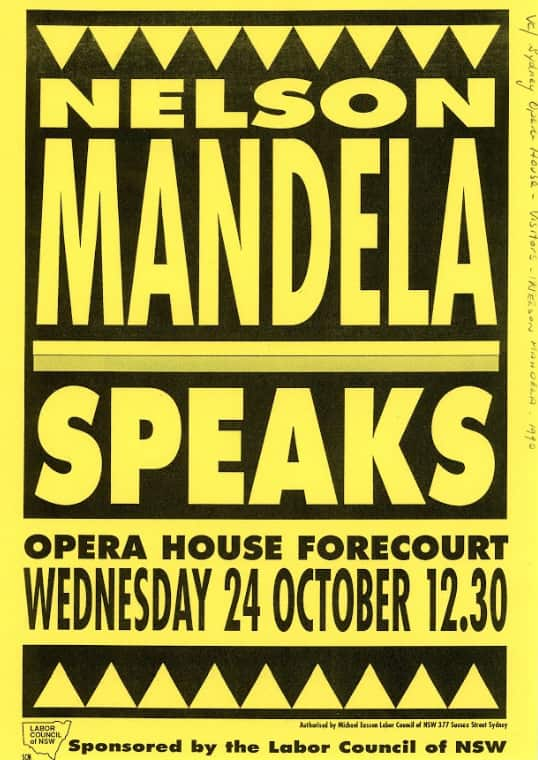In his first year of freedom, Nelson Mandela visited Australia to say thanks for opposing apartheid.
Released from prison in May 1990, Mandela was still four years from becoming South Africa’s first black president. From the Sydney Opera House steps on October 24, the anti-apartheid leader addressed a crowd of 40,000, including me.
I remember his deliberate, halting delivery. The air of inspiration. The mixture of awe and celebration in those around me, and the choir’s rendition of Nkosi Sikelel’ iAfrica ("God Bless Africa").
Mandela was initially so moved by the choir’s performance that he did not begin speaking. But he was soon praising the effect of sanctions in putting pressure on South Africa’s apartheid regime, which had segregated and racially discriminated against that nation’s black majority for decades.
“I can recall how we prisoners of apartheid whispered to each other about your very healthy and militant actions, about your disavowal of an all-white Springbok team from a country where your black brothers and sisters toiled under apartheid rule,” Mandela said.
“Your actions, and those of anti-apartheid workers worldwide, gave us strength and confidence that our just cause would prevail in the end.”
“Today I stand before you happy at the opportunity to thank you in person. I salute you!”
Here in 2017, it might seem odd that a freed South African dissident chose to visit Australia. But Mandela had befriended then Prime Minister Bob Hawke who, as ACTU president in the 1970s, took a stand against whites-only sporting teams from South Africa.
For decades, Australian cricket and rugby union players had faced sanctions if they joined rebel tours there. Along with economic measures against apartheid, such pressure was seen as instrumental in pushing for change.

“Whether we have won the fight or not is irrelevant,” Mandela continued. “The message that we have been able to put across to our people is that it is victory if a man or woman has done his duty on Earth.
“Many of our people have accepted the principle, and they are prepared to fight back if the government does not want to cooperate with us. And the only way of cooperating with us… is to allow people enjoy the principle of one person, one vote. This is the only way we can establish a non-racial, democratic, united and non-sexist state in South Africa.”
He emphasised non-sexist, pointing out that his speechwriter was a woman.
“You have given us a note of inspiration. You have given us the ability to continue the fight, and to continue with the negotiations, in the certainty that the world generally and the people of Australia and Sydney particularly, are solidly behind us.”
It seemed the 1990s would be a decade of change. The next year, Nelson Mandela became President of the African National Congress (ANC) and on 10 May 1994, he was elected the first President of a united South Africa.
Watch The Nineties on every Sunday night at SBS from 8:30pm. You can delve deep into the decade with previous episodes streaming now at SBS On Demand:
